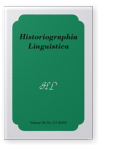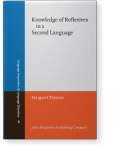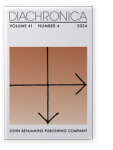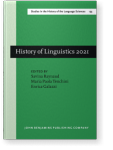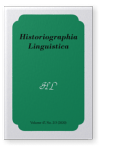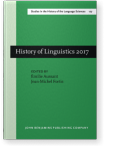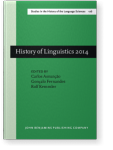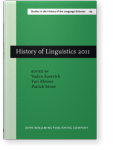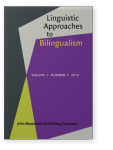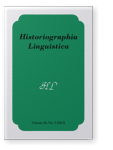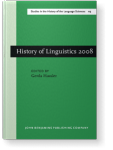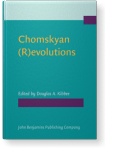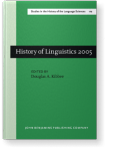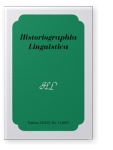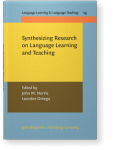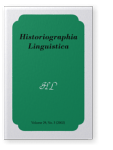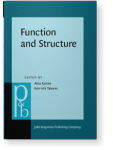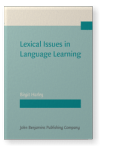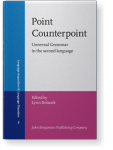Margaret Thomas
List of John Benjamins publications for which Margaret Thomas plays a role.
Journal
Title
Knowledge of Reflexives in a Second Language
Margaret Thomas
[Language Acquisition and Language Disorders, 6] 1993. x, 234 pp.
Subjects Applied linguistics | Language acquisition | Syntax
2024 Diachrony and Diachronica: 40@40 Diachronica 41:4, pp. 556–574 | Editorial
2024 Chapter 13. Three documents bearing on the foundation of the Linguistic Society of America in the age of scientific racism History of Linguistics 2021: Selected papers from the 15th International Conference on the History of the Language Sciences (ICHoLS 15), Milan, 28 August – 1 September, Raynaud, Savina, Maria Paola Tenchini and Enrica Galazzi (eds.), pp. 198–210 | Chapter
The centennial of the Linguistic Society of America invites reflection on how the organization has arrived at its current activist stance, which prioritizes social-justice issues and anti-racist initiatives within the discipline of linguistics. This article highlights the inward-looking nature of… read more
2020 The monolingual approach in American linguistic fieldwork Historiographia Linguistica 47:2/3, pp. 266–302 | Article
In the first decades of the 20th century, fieldwork — collection of language data through direct interaction with a native speaker — was foundational to American linguistics. After a mid-century period of neglect, fieldwork has recently been revived as a means to address the increasing rate of… read more
2020 On the reception and revivification of Cartesian linguistics History of Linguistics 2017: Selected papers from the 14th International Conference on the History of the Language Sciences, (ICHoLS 14), Paris, 28 August – 1 September, Aussant, Émilie and Jean-Michel Fortis (eds.), pp. 157–170 | Chapter
Fifty years after its publication, it is timely to return to Noam Chomsky’s Cartesian linguistics to explore what this controversial text accomplished, what it didn’t accomplish, and for whom. I begin with the context of midcentury American linguists’ historical consciousness into which… read more
2016 What do we talk about, when we talk about the history of linguistics? A view from the United States History of Linguistics 2014: Selected papers from the 13th International Conference on the History of the Language Sciences (ICHoLS XIII), Vila Real, Portugal, 25–29 August 2014, Assunção, Carlos, Gonçalo Fernandes and Rolf Kemmler (eds.), pp. 3–16 | Article
This paper examines the representation of the history of the language sciences as transmitted through introductory textbooks on linguistics published in the United States in the past sixty years. I analyze the role that textbooks assign to the history of the discipline, the value they invest in it,… read more
2014 Jakobson’s circles History of Linguistics 2011: Selected Papers from the 12th International Conference on the History of the Language Sciences (ICHoLS XII), Saint Petersburg, 28 August - 2 September 2011, Kasevich, Vadim, Yuri A. Kleiner and Patrick Sériot (eds.), pp. 145–155 | Article
Russian philologist Roman Jakobson (1896–1982) incubated his ideas within a sequence of “Circles”, self-consciously established groups of scholars who crossed institutional affiliations to discuss shared interests and support each others’ (and sometimes, the group’s communal) work. Jakobson’s… read more
2013
This article surveys nine graduate programs that confer doctoral degrees in Second Language Acquisition, the first of which was founded in 1988, 25 years ago. I examine warrants for the establishment of PhD programs in second language acquisition, the array of institutional bases on which they… read more
2013 Otto Jespersen and “The Woman”, then and now Historiographia Linguistica 40:3, pp. 377–408 | Article
Danish linguist Otto Jespersen’s (1860–1943) Language, its Nature, Development, and Origin was published more than 90 years ago, in 1922. This article focuses on Jespersen’s often-cited Chapter 13, entitled “The Woman”, a text that has served since the 1970s as a touchstone for feminist… read more
2011 Gender and the language scholarship of the Summer Institute of Linguistics in the context of mid twentieth-century American linguistics History of Linguistics 2008: Selected papers from the eleventh International Conference on the History of the Language Sciences (ICHoLS XI), 28 August - 2 September 2008, Potsdam, Haßler, Gerda (ed.), pp. 389–397 | Article
Low levels of participation by women scholars in mainstream American linguistics in the mid twentieth century contrast with evidence, from the 1940s onward, of productive engagement in language study and analysis by women missionary-linguists affiliated with the Summer Institute of Linguistics… read more
2010 What do we talk about, when we talk about ‘universal grammar’, and how have we talked about it? Chomskyan (R)evolutions, Kibbee, Douglas A. (ed.), pp. 301–314 | Article
This article sketches the history of ‘universal grammar’ as a term and as a concept, attending in particular to the range of expressions that have been used to label what human languages have in common. I focus on three contexts: medieval speculative grammar, which developed a concept of universal… read more
2007 Words and concepts for child language learning in late 19th versus late 20th century America History of Linguistics 2005: Selected papers from the Tenth International Conference on the History of the Language Sciences (ICHOLS X), 1–5 September 2005, Urbana-Champaign, Illinois, Kibbee, Douglas A. (ed.), pp. 344–355 | Article
Although children’s acquisition of a first, or native language is a matter of perennial interest, no consensus has emerged in English-language scholarship about how to refer to what it is that children do (or what it is that happens) in the first few years of life, when children move from… read more
2007 The evergreen story of Psammetichus’ inquiry into the origin of language Historiographia Linguistica 34:1, pp. 37–62 | Article
Herodotus recounts the attempt of the pharaoh Psammetichus I to determine which among the peoples of the earth was the oldest. He isolated two children at birth, assuming that their spontaneous speech would reveal the identity of a primordial human language. Although Psammetichus’ inquiry was not… read more
2006 8. Research synthesis and historiography: The case of assessment of second language proficiency Synthesizing Research on Language Learning and Teaching, Norris, John M. and Lourdes Ortega (eds.), pp. 279–298 | Chapter
2002 Roger Bacon and Martin Joos: Generative linguistics’ reading of the past Historiographia Linguistica 29:3, pp. 339–378 | Article
Expositions of the history of western linguistics, especially those designed for a novice readership, often refer to a passage from the writings of the twelfth-century scholar Roger Bacon. That passage is conventionally interpreted as an assertion of the existence of universal grammar, framed in… read more
1999 Some referential properties of English it and that Function and Structure: In honor of Susumu Kuno, Kamio, Akio and Ken-ichi Takami (eds.), pp. 289–315 | Article
1995 The Effect of Imagery-Based Mnemonics on the Long-Term Retention of Chinese Characters Lexical Issues in Language Learning, Harley, Birgit, pp. 167–183 | Article
1991 Do Second Language Learners Have “Rogue” Grammars of Anaphora? Point Counterpoint: Universal Grammar in the second language, Eubank, Lynn (ed.), pp. 375–388 | Article
